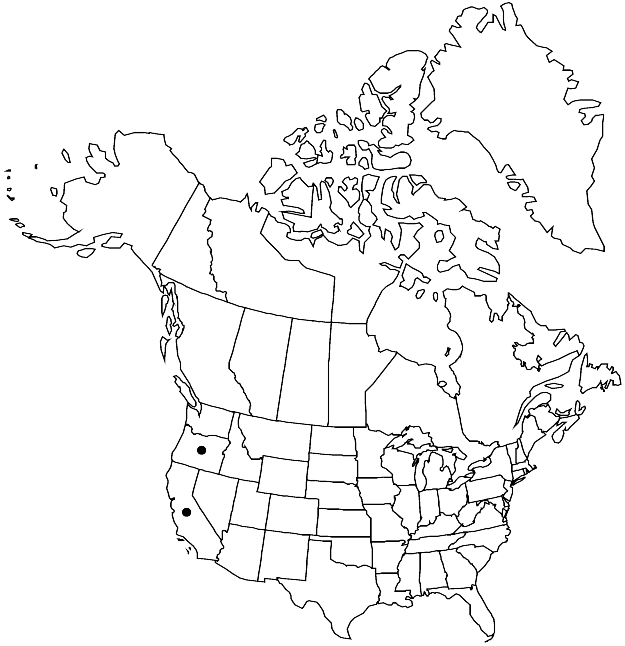Difference between revisions of "Limnanthes floccosa subsp. bellingeriana"
Univ. Calif. Publ. Bot. 25: 501. 1952.
FNA>Volume Importer |
FNA>Volume Importer |
||
| Line 27: | Line 27: | ||
|distribution=Calif.;Oreg. | |distribution=Calif.;Oreg. | ||
|discussion=<p>Of conservation concern.</p><!-- | |discussion=<p>Of conservation concern.</p><!-- | ||
| − | --><p>D. Southworth and J. Seevers (1997) compared pollen of subspp. bellingeriana and floccosa. Pollen of Limnanthes floccosa has a striated zone perpendicular to the apertural band; in subsp. bellingeriana, the striations are criss-crossed and in subsp. floccosa the striations are parallel. Southworth and Seevers reported that the two subspecies could be easily distinguished in the field in mixed populations based on the density of hairs on the sepals. In subsp. floccosa, the hairs are so dense that they prevent the sepals from fully opening; in subsp. bellingeriana, the sepal hairs are relatively short (50 µm) and sparse. Based on the absence of intermediates in these characters, Southworth and Seevers recommended elevating subsp. bellingeriana to species level. Allozyme studies (C. I. McNeill and S. K. Jain 1983) group subspp. bellingeriana and floccosa together, and subspp. californica, grandiflora, and pumila together. Also, in ITS analysis (M. S. Plotkin 1998), subsp. bellingeriana is nested within the floccosa clade. Crosses between subspp. bellingeriana and floccosa resulted in viable hybrids (R. Ornduff 1971). Subspecies bellingeriana is found in shaded, damp edges of meadows; sympatric subsp. floccosa occurs on the upper, dry, exposed edges of meadows (M. T. K. Arroyo 1973). On balance, I prefer to retain this taxon as a subspecies within L. floccosa. Subspecies bellingeriana is in the Center for Plant Conservation’s National Collection of Endangered Plants.</p> | + | --><p>D. Southworth and J. Seevers (1997) compared pollen of subspp. bellingeriana and floccosa. Pollen of <i>Limnanthes floccosa</i> has a striated zone perpendicular to the apertural band; in <i></i>subsp.<i> bellingeriana</i>, the striations are criss-crossed and in <i></i>subsp.<i> floccosa</i> the striations are parallel. Southworth and Seevers reported that the two subspecies could be easily distinguished in the field in mixed populations based on the density of hairs on the sepals. In <i></i>subsp.<i> floccosa</i>, the hairs are so dense that they prevent the sepals from fully opening; in <i></i>subsp.<i> bellingeriana</i>, the sepal hairs are relatively short (50 µm) and sparse. Based on the absence of intermediates in these characters, Southworth and Seevers recommended elevating <i></i>subsp.<i> bellingeriana</i> to species level. Allozyme studies (C. I. McNeill and S. K. Jain 1983) group subspp. bellingeriana and floccosa together, and subspp. californica, grandiflora, and pumila together. Also, in ITS analysis (M. S. Plotkin 1998), <i></i>subsp.<i> bellingeriana</i> is nested within the floccosa clade. Crosses between subspp. bellingeriana and floccosa resulted in viable hybrids (R. Ornduff 1971). Subspecies bellingeriana is found in shaded, damp edges of meadows; sympatric <i></i>subsp.<i> floccosa</i> occurs on the upper, dry, exposed edges of meadows (M. T. K. Arroyo 1973). On balance, I prefer to retain this taxon as a subspecies within <i>L. floccosa</i>. Subspecies bellingeriana is in the Center for Plant Conservation’s National Collection of Endangered Plants.</p> |
|tables= | |tables= | ||
|references={{Treatment/Reference | |references={{Treatment/Reference | ||
| Line 54: | Line 54: | ||
|publication year=1952 | |publication year=1952 | ||
|special status= | |special status= | ||
| − | |source xml=https://jpend@bitbucket.org/aafc-mbb/fna-data-curation.git/src/ | + | |source xml=https://jpend@bitbucket.org/aafc-mbb/fna-data-curation.git/src/8f726806613d60c220dc4493de13607dd3150896/coarse_grained_fna_xml/V7/V7_229.xml |
|genus=Limnanthes | |genus=Limnanthes | ||
|section=Limnanthes sect. Inflexae | |section=Limnanthes sect. Inflexae | ||
Revision as of 18:56, 18 September 2019
Herbage glabrous. Stems erect to ascending. Flowers urn-shaped; sepals accrescent, narrowly ovate, 5.5–8 mm, abaxially and adaxially glabrous or sparsely hairy; petals oblong, 5.5–7.5 mm, apex retuse, (without marginal hairs basally); filaments 2–3.5 mm; anthers ± 0.5 mm, usually dehiscing introrsely; style 2.3–2.5 mm. Nutlets 1 or 2 (3), tubercles platelike.
Phenology: Flowering Apr–May.
Habitat: Vernal pool edges in shallow soil of rocky meadows
Elevation: 300-1200 m
Discussion
Of conservation concern.
D. Southworth and J. Seevers (1997) compared pollen of subspp. bellingeriana and floccosa. Pollen of Limnanthes floccosa has a striated zone perpendicular to the apertural band; in subsp. bellingeriana, the striations are criss-crossed and in subsp. floccosa the striations are parallel. Southworth and Seevers reported that the two subspecies could be easily distinguished in the field in mixed populations based on the density of hairs on the sepals. In subsp. floccosa, the hairs are so dense that they prevent the sepals from fully opening; in subsp. bellingeriana, the sepal hairs are relatively short (50 µm) and sparse. Based on the absence of intermediates in these characters, Southworth and Seevers recommended elevating subsp. bellingeriana to species level. Allozyme studies (C. I. McNeill and S. K. Jain 1983) group subspp. bellingeriana and floccosa together, and subspp. californica, grandiflora, and pumila together. Also, in ITS analysis (M. S. Plotkin 1998), subsp. bellingeriana is nested within the floccosa clade. Crosses between subspp. bellingeriana and floccosa resulted in viable hybrids (R. Ornduff 1971). Subspecies bellingeriana is found in shaded, damp edges of meadows; sympatric subsp. floccosa occurs on the upper, dry, exposed edges of meadows (M. T. K. Arroyo 1973). On balance, I prefer to retain this taxon as a subspecies within L. floccosa. Subspecies bellingeriana is in the Center for Plant Conservation’s National Collection of Endangered Plants.
